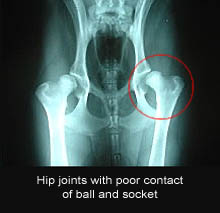

We thought we would explain what Hip Scores are, and what they mean for your puppy. Here at Ridgy Didge Cobberdogs, we decided early on that we would start doing Penn Hip & Elbow X-rays on all our potential breeding dogs, along with extensive testing for genetic diseases and coat traits, to help us improve our genetics.
Why Hip Scores? You may have heard of hip dysplasia (Congenital Hip Dysplasia, CDH). It’s a problem where the hip socket doesn't fully cover the ball part of the joint. This creates a poor fit in the hip joint and makes it more vulnerable to stress and damage. These changes accelerate wear and tear on the joint, which eventually leads to painful osteoarthritis. Hip scores report on the status of the joints and the potential risk of joint problems, including CDH.
How are Hip Scores done? X-rays of hips and elbows are taken under General Anaesthetic & sent to America for reading, often being reported on by three independent vets. If the results are not good enough we remove the dog from our breeding program and he/she continues to live with their guardian family as their desexed pet. These are lengthy and expensive processes for us given our dogs only have one to two litters of pups.
What causes hip dysplasia? When we think of hip dysplasia we tend to think of big breeds like Labradors, Rottweilers, mastiffs and shepherds. But greyhounds have great hips! And pugs and French bulldogs are small breeds but high on the hip dysplasia risk list. So hip dysplasia is not merely related to size; it is partly to do with genetics, but it is also strongly influenced by other factors including nutrition, exercise and lifestyle stress.
Breeder responsibility: So, it IS very important to consider genetics and breeding, and worthwhile knowing the hip scores of our breeding dogs before we breed them. So by only breeding dogs that pass the standard test, the risk of hip dysplasia in the breeding lines continues to reduce. You will find all our Ridgy Didge breeding dogs’ hip scores and genetic testing results in our Breeding Dogs pages on our website. Although genetics contribute to the risk of Hip Dysplasia there are many other factors for the owner to consider.
Your responsibility: And for your part, it’s very important to take care to protect your pup’s joints from those other influences as they grow and develop. Your puppy’s skeletal growth is not complete until around 18-24 months, so take good care of those joints – the following are important points to help prevent undue stress on your developing puppy’s joints:
Don’t overfeed: Allowing your puppy to become overweight really increases the risk of hip problems. Check with your vet if you are concerned about your pup's diet.
Good nutrition: a quality balanced diet is critical to grow strong healthy bones & joints and the right balance of body fat and muscle for good strength. See our page about feeding for health.
No forced or excessive exercise: any exercise that doesn’t allow puppy to rest when he needs or wants will cause excessive joint stress. Pups don’t need long walks; socialising is different – take puppy out with you as much as possible to different places and let pup have a play in the new place. Never lead puppy from a bike or skateboard. Paddle-boarding is also strenuous, sustained work on young joints.
Avoid environment and lifestyle risks: avoid undue stresses on puppy’s joints in your home environment and activities. Don’t allow jumping onto and down from furniture & beds, running up and down stairs, slippery floors, excessive ball fetching, too much time on soft sand, children picking up or dropping puppy.
Keep paw pads trimmed & free of hair: this helps prevent puppy slipping and sliding on slippery surfaces, preventing joint damage.
By protecting your puppy’s joints as they develop, you can rest assured that your puppy has the best chance of growing to adulthood without hip problems, see our webpage for more detailed information.
If you would like to adopt a Ridgy Didge Australian Cobberdog, please read our Adopting a Puppy information, before you continue the adoption process. For more information, pm us on Facebook, or contact us at our website. Like and follow us on Facebook to keep up to date with ongoing puppy news and announcements.
